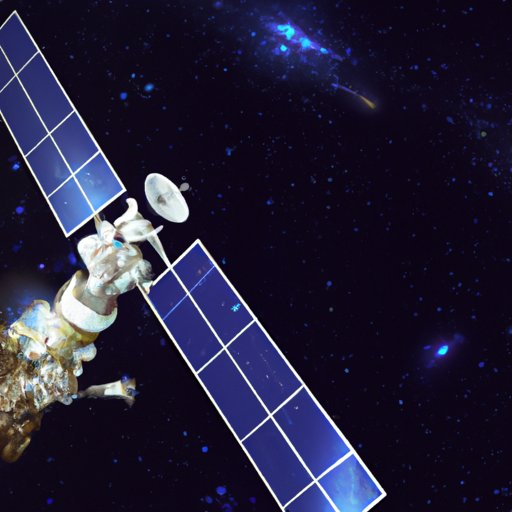Introduction
Space travel is the exploration of outer space by means of manned or unmanned spacecrafts. It is the act of leaving Earth’s atmosphere and entering into the void of deep space, where humans are able to explore new worlds and make discoveries that have never been seen before. In this article, we will explore the history of space travel, the safety and preparation involved, the challenges faced, the impact it has on humanity, advances in technology, and the benefits associated with space exploration.

Exploring the History of Space Travel
The history of space travel dates back centuries, with early pioneers such as Tsiolkovsky and Goddard developing theories and designs for spacecrafts. These visionary thinkers paved the way for the first major milestone in space exploration: the launch of the first artificial satellite, Sputnik 1, by the Soviet Union in 1957. This event marked the beginning of the Space Race, a competition between the United States and the Soviet Union to become the first nation to put a man into space.
A few years later, in 1961, the Soviet Union achieved the first human spaceflight with cosmonaut Yuri Gagarin, who orbited the Earth once during his mission. The United States followed suit in 1962, with astronaut John Glenn becoming the first American to orbit the Earth. Since then, space exploration has advanced rapidly, with both countries launching multiple missions to the Moon, sending probes to other planets in the Solar System, and establishing permanent space stations in Earth’s orbit.
Today, space exploration is an international effort, with numerous countries participating in various projects and missions. Major achievements include the launch of the Hubble Telescope, the development of the International Space Station, and the recent landing of the Mars Curiosity Rover. Despite these accomplishments, there is still much to be explored and discovered in the realm of space travel.
Safety and Preparation for Space Travel
Space travel requires extensive planning and preparation in order to ensure the safety of those involved. Pre-flight preparations involve training astronauts in the necessary skills and knowledge to complete the mission, as well as designing and constructing the spacecraft. During the flight, astronauts must remain vigilant and adhere to safety protocols in order to protect themselves from the dangers of space, including radiation and extreme temperatures.
Post-flight considerations are also important, as astronauts must re-acclimatize to Earth’s environment after spending time in space. This can involve physical and psychological therapy, as well as regular check-ups to monitor any changes in health or behavior. By taking these precautions, astronauts can safely and successfully complete their missions.
Challenges of Space Exploration
Space exploration is not without its challenges. Physical challenges include the effects of weightlessness and exposure to radiation, which can cause long-term damage to the body. Technological challenges include the need for more reliable and efficient spacecrafts, as well as better communication systems to maintain contact with ground control. Financial challenges are also present, as space exploration is an expensive undertaking that requires considerable resources.
The Impact of Space Travel on Humanity
Space exploration has had a profound effect on humanity, both economically and culturally. Economically, space exploration has resulted in the development of new technologies and industries, creating jobs and generating revenue. Culturally, space exploration has inspired people to dream bigger and reach for the stars. It has sparked curiosity and imagination, leading to an increased interest in science and technology.
Psychologically, space exploration has been found to have a positive effect on mental health. Studies have shown that astronauts experience improved mood, motivation, and self-esteem after returning from a mission. This is attributed to the sense of accomplishment and pride that comes with being part of something bigger than oneself.

Advances in Technology and Space Exploration
Advances in technology have played a major role in the success of space exploration. Recent innovations such as 3D printing, robotics, and artificial intelligence have enabled us to explore deeper into space than ever before. These technologies have helped to reduce the cost of space exploration, making it more accessible to a wider range of people.
Looking to the future, scientists are working on revolutionary new technologies that could revolutionize the field of space exploration. These include the use of ion propulsion engines, solar sails, and even the possibility of warp drives. If these technologies can be developed, they would enable us to explore farther and faster than ever before.

Benefits of Space Travel and Exploration
While space exploration is often seen as a risky endeavor, it does offer many benefits to humanity. Scientifically, space exploration has led to the discovery of new planets and galaxies, providing us with insights into the nature of the universe. Economically, space exploration has created new markets, stimulating growth in the global economy.
Socially, space exploration has provided inspiration for generations of young people to pursue careers in science and engineering. It has also helped to bridge cultural divides, bringing people from different backgrounds and nations together in pursuit of a common goal. Finally, space exploration has given us a greater appreciation for our planet and the importance of preserving it for future generations.
Conclusion
Space travel is an incredible journey of exploration and discovery. From its humble beginnings to its current status as an international affair, space exploration has come a long way. While there are many challenges to overcome, the potential benefits to humanity are immense. With advances in technology and a continued commitment to exploration, the possibilities for space travel seem endless.
In conclusion, space exploration is an exciting and important field of study that has the potential to unlock some of the greatest mysteries of the universe. Through continued research and innovation, we may one day be able to realize the full potential of space travel and exploration.
Final Thoughts
Space exploration is a fascinating and rewarding endeavor. It has the power to open up new frontiers and allow us to explore places that were once thought to be unattainable. As we continue to push the boundaries of space exploration, we can only imagine what the future may hold.
(Note: Is this article not meeting your expectations? Do you have knowledge or insights to share? Unlock new opportunities and expand your reach by joining our authors team. Click Registration to join us and share your expertise with our readers.)
